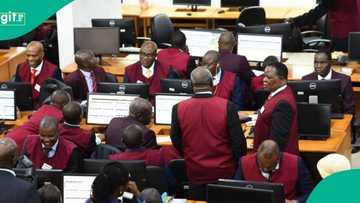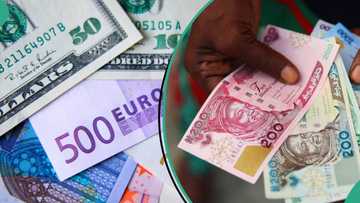"MSMEs Struggle Under High Interest Rates": CSED Calls For Efficiency Through Digital Solutions
- The Centre for Strategic Enterprises Development (CSED) has stressed the imperative of empowering MSMEs
- CSED stated that offering a single-digit credit to MSMEs would significantly improve purchasing power and empower more businesses
- The centre said the recent hike in interest rates by CBN is stifling business growth instead of helping to tame inflation
Legit.ng’s Pascal Oparada has reported on tech, energy, stocks, investment, and the economy for over a decade.
The Center for Strategic Enterprise Development (CSED) has disclosed the importance of nano, micro, small and medium enterprises to Nigeria’s economy.
The organization stressed this at a business launch with selected nano, micro, small, and medium enterprises (MSMEs) at their headquarters in Abuja, Nigeria.

Source: Original
CBN interest rate hike is counterproductive
The event coincided with the United Nations MSME Day on June 27th and connected virtually with CSED's co-founder and Head of Global Agenda in the United Kingdom.

Read also
World MSME Day: Niger Delta govts urged to embrace digital economy, support small businesses
PAY ATTENTION: Сheck out news that is picked exactly for YOU ➡️ find the “Recommended for you” block on the home page and enjoy!
The event focused on the recent Monetary Policy Rate (MPR) of the Central Bank of Nigeria (CBN), in which the apex bank hiked Nigeria’s interest rate to curb inflation.
MSMEs expressed unanimous concern, stating the new policy is hindering business activity. Micro and small businesses are reportedly shutting down due to a rapid drop in purchasing power. The rising price of goods erodes capital and profits, making restocking nearly impossible.
CSED Co-founder/CEO Izu Divine Freeman acknowledged that the interest rate is a standard tool for fighting inflation but doubts its effectiveness in the current Nigerian situation.
He said:
"In established economies with credit systems, higher interest rates discourage excessive spending. However, Nigeria is a cash-based economy. Debit cards, the most common type, function like cash. So, the interest rate hike won't affect consumers directly, but rather businesses reliant on credit for production or restocking."

Read also
After USSD, NGX unveils e-platform for Nigerians to buy Dangote, banks and other company shares
Access to credit can boost MSMEs
He stressed that businesses with access to credit can raise prices to offset the high cost of credit, further squeezing consumer purchasing power. Businesses without access may be forced to shut down.
Ikechukwu Okoli, CSED Co-founder and head of Global Agenda stated that reducing interest rates would allow businesses to access funds for production and increase product availability to mitigate inflation.
He also stated that improving security would encourage farmers to return to the farms to boost food production.
Lack of infrastructure destroying MSMEs
He also highlighted that reliable electricity is essential for manufacturing and economic activity.
Freeman said that findings show that many MSMEs need help accessing government interventions due to complex application processes.
He said this is why CSED created Capsule, a technology streamlining MSME operations.
Capsule offers various functionalities, including MSME digitization, automated credit score generation, standard financial statement creation, Permission-based sharing of processed reports with funding marketplaces

Read also
Nigeria records massive dollar inflow as CBN gives new orders to UPS, Western Money Transfer, others
CBN abandons the price verification portal
Legit.ng earlier reported that the Central Bank of Nigeria (CBN) announced on Wednesday, June 26, 2024, that it will stop its Price Verification System (PVS) Portal beginning July 1, 2024.
The decision comes amid recent developments in the Nigerian foreign exchange market.
The apex bank announced in a circular issued by W.J. Kanya, the acting director of the trade and exchange department, citing a previous circular dated August 17, 2023.
PAY ATTENTION: Unlock the best of Legit.ng on Pinterest! Subscribe now and get your daily inspiration!
Source: Legit.ng


